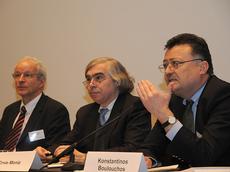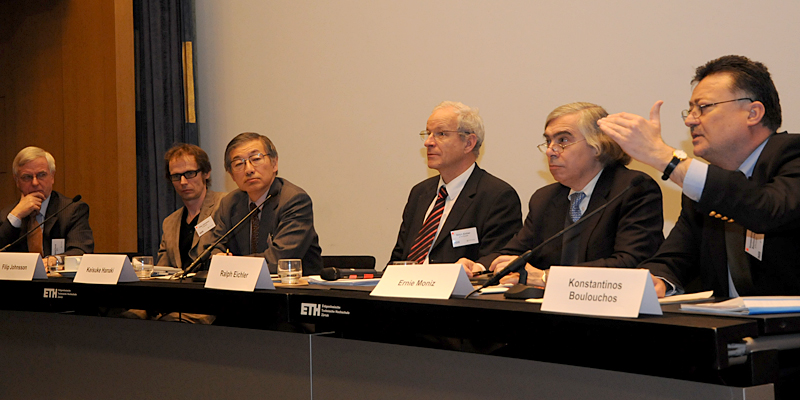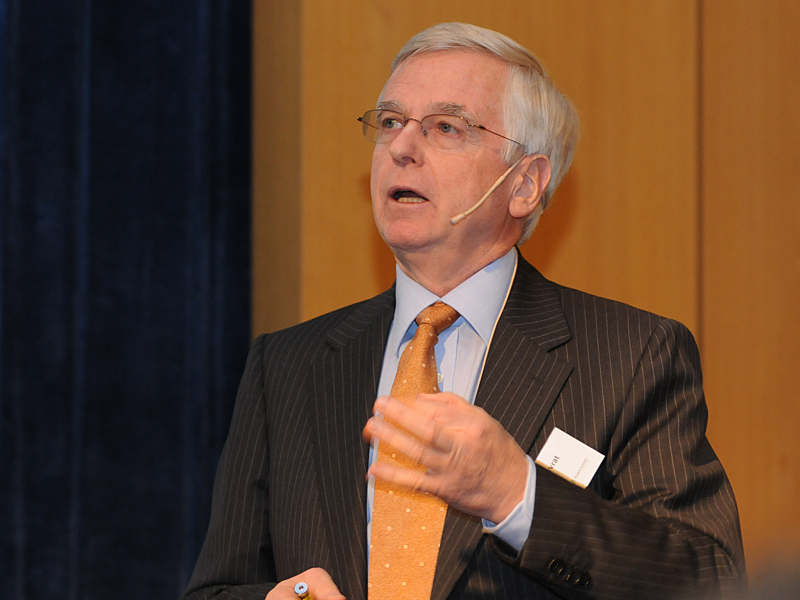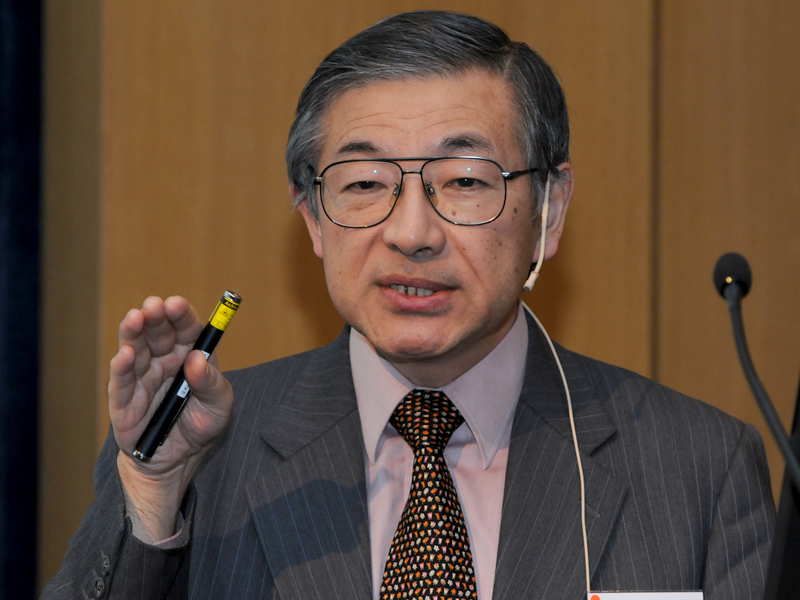A shared destination – many different routes
This year’s meeting of the “Alliance for Global Sustainability” (AGS) is taking place at ETH Zurich. Last Tuesday, energy experts from five institutions of higher education talked about different energy systems and their contribution to a sustainable society. The speakers were unanimous: CO2 is the problem of the minute and needs quick technological and political action.

Anyone who comes into the
main hall of ETH Zurich
nowadays will soon notice that something unusual is happening: one is tempted
to browse the paper mountain of poster presentations, and languages from the
four corners of the globe with skin colours of every hue dispense refreshing
liberal-mindedness. At the same time there are animated conversations between
students and experienced scientists about research and technology that may one
day contribute to mankind’s better handling of its limited resources.
The annual meeting of the Alliance
for Global Sustainability (AGS) in 2009 is taking place at ETH Zurich under
the title “New Technologies for meeting the Urban Futures Challenge” (see box) in close cooperation with
the “Student Summit for Sustainability” (S3) being held simultaneously in Zurich
and Kreuzlingen. A two-hour podium discussion entitled “Pathways to sustainable
energy systems: How does energy research offer pathways to transform energy
systems for sustainability?” took place last Tuesday in the context of the
one-week program of the AGS Annual Conference. In a first round, energy experts
from five of the higher education institutions affiliated to the AGS gave short
presentations of their institutions’ projects or strategies. Konstantinos
Boulouchos, Director of the Energy Science Center
of ETH Zurich, opened
the round by presenting to the guests the aims of the ETH Zurich Energy
Strategy, which was published in 2008, and the call contained in it for a
reduction of CO2 emissions to one ton per capita per year. Like Boulouchos,
the subsequent speakers also focused their talks on the problem of CO2.
CO2 reductions of 70 percent possible
Ernest J. Moniz from the
MIT Energy Initiative called for close cooperation between research and
industry. He said that this was the only way to establish long-term sustainable
technologies in society. Today, one of MIT’s biggest solar energy projects is already
being funded by an Italian oil group, which, according to Moniz, shows clearly
that there is great interest nowadays in alternative technologies even among
producers of traditional energy sources. However, he believes that technologies
of the future such as photovoltaics will not be available on a large scale in
the short term, which is why he thinks that the biggest short-term contribution
to reducing CO2 emissions lies in innovations connected with existing
energy systems.
Keisuke Hanaki of the University of Tokyo presented the “Japan Low Carbon
Society” project, which was initiated with support from the Japanese
Environment Ministry. In their study, Japanese scientists were able to
demonstrate that the technological potential exists to reduce Japan’s CO2
emissions by 70 percent (compared to 1990) by 2050. They say this could be
achieved through far-reaching structural adjustments and the implementation of
more efficient technologies without at the same time neglecting the public’s
socio-economic needs.
Using energy as the Neanderthals once did
Fillip Johnsson from the
Chalmers University of Technology believes that a rapid reduction in CO2
emissions is achievable only via a financial charge. However, he can already
see today the first signs that a change of heart towards sustainable behaviour
is taking place in society. His illustration of this included advertisements in
which off-road vehicles with a high fuel consumption are being sold at
ridiculously low prices. Johnsson, like Moniz, also identifies a high potential
in the separation of CO2 at the point of origin of the pollutant.
Daniel Favrat from the
Industrial Energy Systems Laboratory of EPF Lausanne (LENI) criticised the backward
way in which fossil fuels are utilised nowadays. He said that heating with
petroleum, as is still done today in many households, differs little in terms
of the type of energy it uses and how the energy is converted from the fire
with which the Neanderthals once warmed themselves. Based on LENI research
projects, Favrat showed clearly how energy can now be supplied much more
efficiently to whole districts through thermodynamic innovations in the shape
of centralised power stations.
The focus on 2050 as the
time horizon was conspicuous in all the lectures. Later Boulouchos expressed
the opinion that 2050 was a compromise: he said that 2100 was too far in the
future to create a binding obligation – even though far-reaching radical social
changes are possible only over such periods of time. On the other hand, due to
reinvestment cycles and the inertia of human behaviour, he said that 2020 was
too short-term to permit changes that were already far-reaching.
“Let’s get serious!”
The nature of fruitful
collaboration between institutions of higher education and the world of
politics was the question that came to the fore during the subsequent
discussion moderated by ETH Zurich President Ralph Eichler. Those taking part
in the discussion were unanimous in their belief that, first and foremost,
scientists should show politicians potential paths toward solutions, but
politicians cannot dictate the way transformations should take place. Establishing
international networks to give better public access to available knowledge was
also important – a need already voiced by Hiroshi Komiyama, President of the
University of Tokyo, in a lecture shortly before the panel session.
One member of the audience thought
that the path outlined to a new energy era was too long and asked whether, to
solve the enormous global challenges, it was not science’s task to propagate
revolutionary ideas for a radical change as well. Eichler voiced his opinion in
a counter-question: he wanted to know whether a CO2 reduction by 70 to
80 percent by 2050, as targeted by Japan or the EU, wasn’t revolutionary
enough. Here, the panel members also drew attention to the fact that a transformation
of infrastructure in the energy industry will entail far-reaching consequences
and is therefore achievable only in the long term.
However, Moniz is convinced
that much more could already be being done to counter CO2 emissions than
is happening at present, considering as he does CO2 sequestration to
be the biggest opportunity that is already available. His concluding appeal to
the public was, “We are not very
serious by now. Let`s get serious!”
In reply to a question
after the panel event, Konstantinos Boulouchos said: “As can be seen, energy
experts from leading institutions of higher education are unanimous about the
current problem, namely CO2 emissions. However, each higher
education institution is approaching the problem slightly differently.” Ralph
Eichler said that he believed that the panel had borne out the interdisciplinary
route followed by ETH Zurich
via the Energy Science Center. He hoped that the research results and
concepts from such institutions will be brought to the public’s attention to a
greater extent and discussed more widely in the future.
Alliance for Global Sustainability (AGS)
AGS is an international, multidisciplinary collaboration project between four universities – ETH Zurich, the Massachusetts Institute of Technology (MIT), the University of Tokyo and the Chalmers University of Technology. The higher education institutions involved have been discussing science and research for a sustainable future since 1997. These efforts result in possible routes for transformation into a sustainable society and suggestions brought to the attention of political decision-makers. The annual conference of the AGS is taking place from 26 to 29 January 2009 at ETH Zurich. The Student Summit for Sustainability (S3) of the World Student Community for Sustainable Development (WSC-SD) is also taking place at the same time.










READER COMMENTS